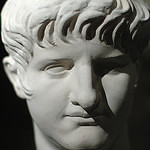
There's a reason why most modern governments don't give any one person absolute power over all the people in the nation. To understand why, we only need to look at one example from history, emperor Nero.
The ascent of Nero to power begins with the previous Roman emperor Claudius. Claudius looked out for the interests of the Roman people pretty well... until one decision in his life. When his wife died, he began looking for another wife. Many plots where laid by families throughout the empire to marry into the sphere of absolute power over the empire. But after much hesitation, Claudius decided to marry his niece Agrippina.
Agrippina was a steel lady. She reigned the empire as harsh as any male Roman emperor. She had a son named Nero, whom she began to train to be the next emperor.
One of her first acts as empress was to return philosopher Seneca to Rome after a decade in exile. She appointed Seneca teacher to her son. Then, she murdered her husband, to clear the throne for her son.
Nero proved to be a good student at first. He had an interest in learning and arts. During his reign, he built theatres and promoted athletic games.
But as he was reaching adulthood, his mother and his teacher began to notice very alarming behavior. The young Nero liked to stroll through the bars of Rome at night. When returning home, he beat up people he met, murdered them, and raped wives of Rome's residents. Relationships with his mother quickly deteriorated, as she heard reports of his nightly activities. Nero did not like to listen to his mother's rebukes. He also began to realize that his mother was the only obstacle in his path to absolute power. They both had steel personalities. And there was no way they would share their power. So Nero decided to murder his mother. His first attempt was to try to drown her in a ship, as she was sailing to shore from a "mending relationships" rendezvous on Nero's ship. By a miracle, Agrippina survived and swam to shore. Then, Nero sent a group of his soldiers to stab her to death with swords.
The empire was shocked at the act. Murdering your own mother was considered too cruel even to the blood-thirsty Romans. But no one dared to protest, fearing for their own lives. The empire was thrust into tyranny from their own ruler. Nero continued murdering his people like he did before, but at an increasing rate.
Plots of assassination began to bloom among the citizens of the empire. They could no longer bear their insane emperor.
A freed slave woman gained an audience with Nero's closest man, and tried to convince him to assassinate Nero. But he reported the woman to Nero. Nero had her limbs torn and dragged her through the streets, along with other cruelties, until she committed suicide.
One day, Nero decided to burn the city of Rome, to clear the path for his new palace, or to just enjoy the sight of a burning city full of people. When the fire burned itself out, all but two districts of Rome were damaged. Rumors, began to spread that Nero himself started the fire. Some people saw him fiddling as the city was burning.
To shift the blame from himself, Nero found a scapegoat in a new religious group called Christians. He ordered thousands of them to be tied to poles in his garden and burned in fire, because he wanted to light up his garden with thousands of living light torches. Nero was the first Roman emperor to persecute Christians.
It was this emperor that apostle Paul was forced to seek hearing from when his enemies in Jerusalem where trying to kill him. It was no wonder that this voyage to Rome was his last. It is also believed that apostle Peter was executed during Nero's reign.
After 17 years of rule, and after several attempted uprisings, one uprising led to Nero's death. In March 68, Gaius Julius Vindex, the governor of Gallia, called Servius Sulpicius Galba, the governor of Hispania, to help him with a rebellion against Nero. As the rebellion progressed, Nero found himself alone in his palace when waking up one morning. He cried, "Have I neither friend nor foe?" Then, he found one loyal subject who offered him refuge at his villa.
A courier brought news to Nero that the Senate has voted to execute him. Nero decided to commit suicide. Finding no courage to take his own life, Nero ordered one of his friends to do it for him.
The Senate never voted on Nero's execution, but the truth reached Nero too late.
Sources: http://wikipedia.com/Nero
